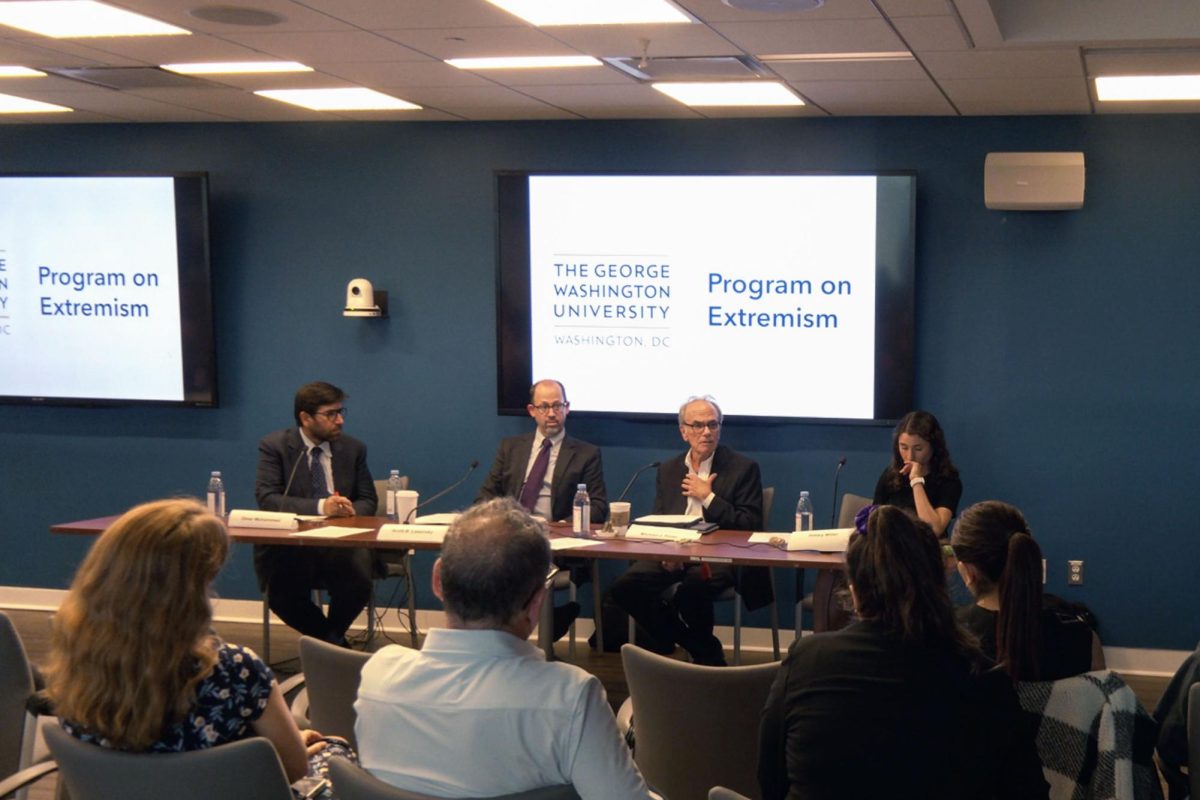Four experts on antisemitism discussed its recent resurgence in the United States and the rising need to monitor and combat antisemitism in a discussion at the Elliott School of International Affairs Wednesday.
Researchers on hate and extremism Scott Lasensky, Michael Feuer and Hilary Miller discussed antisemitism’s “recent disturbing rise” across the world and ways governments and educational institutions like GW can prevent it. The GW Program on Extremism hosted the panel, which was moderated by Omar Mohammed, the head of the program’s antisemitism research initiative.
Lorenzo Vidino, the program’s director, opened the panel and said antisemitism is an “inevitable” issue for extremism researchers to study, because it transcends hateful ideologies and movements.
“The more we looked and studied from different perspectives, all these different forms of extremism, we found that the one glue, the one common denominator across all these ideologies is antisemitism,” Vidino said.
Miller, a policy analyst for the U.S. Commission on International Religious Freedom, said her research revealed U.S. efforts to combat antisemitism are “outdated” and behind like-minded countries due to the lack of coherence in America’s internal and external policy on antisemitism.
She said the issue is compounded in the U.S. because of wide-ranging freedom of speech protections that do not exist in other countries, like Germany, which has laws preventing public Holocaust denial and disseminating Nazi propaganda.
Miller said she agreed with Vidino’s observation that antisemitism does not originate from a single source, which can make it especially difficult to prevent and combat.
“I felt truly disoriented and overwhelmed by the nature of contemporary antisemitism,” Miller said. “That this Gordian knot of hate metastasizing across modern America was deeply complicated—it was not coming from a single source.”
Miller said her most troubling findings showed that the rise of antisemitic hate was “not just a threatening online presence” but was translating to the real world.
Since the Oct. 7 Hamas attacks on Israel, the Anti-Defamation League tracked a 140 percent increase in antisemitic incidents in the United States, from 3,698 in 2022 to 8,873 in 2023, the highest number on record since the ADL began tracking antisemitic incidents in 1979.
Lasensky, a senior advisor for the U.S. State Department Office of the Special Envoy to Monitor and Combat Antisemitism, said the U.S. was a leader in drafting and adopting the Global Guidelines for Countering Antisemitism released in July, a 12-point set of principles to guide countries and international organizations shaping antisemitism prevention policy.
“We came up with this idea to try to get governments to speak in chorus around accepted policies that work, that’s a big bet we’re playing,” said Lasensky. “We’re doing lots of other things, the U.S. government is doing tremendous amounts here domestically, but that’s something new on the international policy scene.”
Lasensky said 36 countries and four international organizations have endorsed the plan so far, but he expects more to follow as the office works to secure more endorsements.
“We don’t just go to countries where Jewish communities live,” Lasensky said. “We believe in what the document says that it’s applicable, and there’s a role for all governments, regardless of whether there are large or small Jewish communities in their country.”
Feuer, the dean of the Graduate School of Education and Human Development, said he thinks universities should hold more open dialogues about antisemitism and push back on common false narratives like some of the comments made during protests last spring.
“What distinguishes a university or an educational institution from some uncurated social media site is the fact that we believe in evidence,” Feuer said. “And we’ve been working on some specific ideas to actually encourage people to speak up, to push back.”
A GWPD officer was present for security purposes at the event of about 50 attendees, including several rabbis, which Feurer said was an “indication” of the topic’s importance.
Alyssa Ayres, dean of the Elliott School, was also in attendance.
Feuer said university officials should not be afraid to speak out when they see antisemitic behavior on campuses.
“A university president who spends most of her time protecting everybody else’s free speech rights should also feel okay to say something when she sees something,” Feuer said.
In an interview following the panel, Feuer said he thinks the University is already doing more than they are “given credit for” to combat antisemitism, but promoting “civil” dialogues between opposing groups is a key step to preventing its rise.
University officials resumed talks with pro-Palestinian student groups earlier this month, in order to discuss the group’s demands that the University disclose financial investments and divest from companies with ties to Israel following a weekslong pro-Palestinian encampment organized last spring.
Some Jewish students said the encampment was marked by antisemitic rhetoric and made them feel unsafe on campus. Students said they were made uncomfortable by signs that read “students will leave when Israelis leave” as well as protest chants that called for an Intifada, which some said carries antisemitic sentiments.
“I think it’s again important to remind ourselves that we care about civil discourse in our classrooms, that we’re going to pay attention to how we do it, so that we can raise difficult topics, difficult history, difficult current events, and do it in a way that promotes engagement, learning and confronting some of our own prior views on things,” Feuer said.
Feuer said new generalized university guidelines on antisemitism would be difficult to draft and implement because of the complicated nature of the topic. He said discussions among faculty about positive and negative classroom incidents and sharing “tricks of the trade” to navigate discussions is a better plan.
“All of that is something that our faculty care about deeply, because that’s why they’re in this business,” Feuer said. “We can be building on our foundations of not just faith in that principle of education, but in our experience and doing it.”











